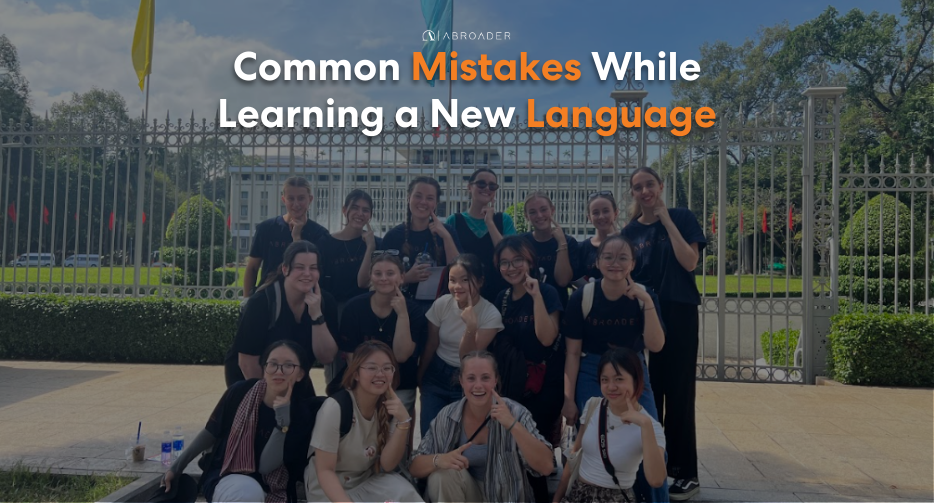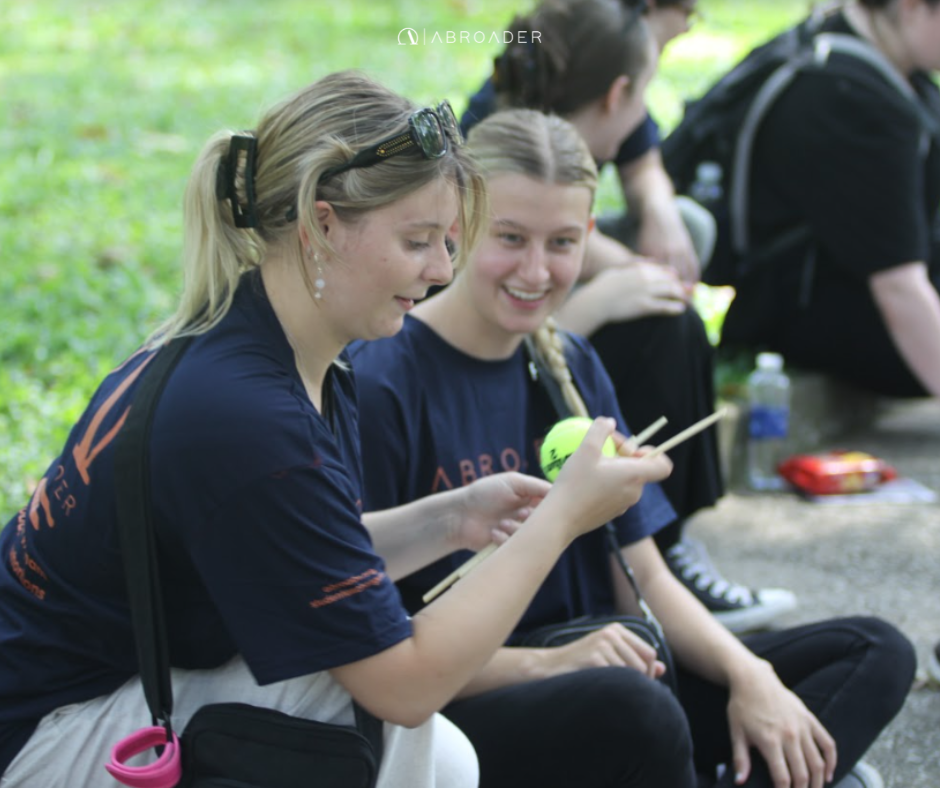Common Mistakes While Learning a New Language
ABROADER February 16, 2023 6 minute read

Learning a new language can be challenging with some common mistakes that can slow down your progress. But do not too worry, we’ll help you!
People who speak more than one language often have an easier time traveling the world, learning new ideas, and communicating effectively with others. Multilingual skills can also boost a resume if you are looking to advance your career. These benefits come at a cost, as learning a new language may not be easy for most people and can come with frustration and error. Here are the most common mistakes learners make when mastering a new language and how to fix them.
Mistake #1: Getting Frustrated Too Easily
Give yourself credit: learning a new language is hard. Like most people, you’ll find that language lessons, regardless of format, will come with blunders… lots of them! Getting frustrated easily or setting unrealistic expectations for yourself will only stunt your progress. Besides, the stress that comes along with that frustration might lead to language-learning burnout and you’ll find yourself putting forth less effort.
To avoid burnout when learning a new language, remember these tips:
- Start slow and focus on the basics
- Set realistic goals
- Ask for help, such as from a language partner
- Accept your mistakes and learn from them
- Take time to recognize and appreciate your milestones
Mistake #2: Ignoring the Benefits of Technology
Having a dedicated linguistic teacher (and language dictionary) is an important part of learning a new language. But who says that a teacher has to be human? Thanks to cell phones, the internet, and apps you can go digital and still learn a language. In fact, ignoring technology might even hurt your growth.
How to use technology more to help master a language:
- Use translator apps like Google Translate to grasp words you just can’t put your finger on. This is also a fun aid for meeting new people who don’t share the same language as you.
- Take fun lessons during downtime (like on a bus or train, or even at home). Duolingo is now a top favorite, but there are other apps too, like Mindsnacks and Memrise.
- Get fancy and splurge on an in-ear translator but use it sparingly to avoid it becoming a linguistic crutch.
Mistake #3: Forgetting to Learn Essential Vocabulary for Everyday Life
Most language textbooks will teach you about grammar and generic sentence usage. Much of this language material is also used around the world and may not necessarily apply to your everyday life. Yes, it is great that you’ve learned about ‘Maria’s favorite farm animals,’ but if you live in a metropolis that isn’t going to help.
How to supplement your lessons with vocabulary that fits your lifestyle:
- Start journaling and observe your daily routine. Take note of the words you use the most and learn how to say them in the language you are learning.
- Seek out interest-based lessons: if you are a musician, visit settings where you will learn more about describing sound, instruments, and venues.
- Converse with new people and get the hang of engaging in meet-and-greet conversation.
- Practice your elevator pitch with the five W’s: Who are you; What do you do for work and hobbies; Where are you from?; When did you arrive / when are you leaving?; Why are you learning a new language?

Mistake #4: Applying Your Own Language Rules to Your Lessons
If this is your first time learning a new language, you might find yourself getting caught in the habit of translating sentences word for word from your own language. Huge mistake! While some languages have similar grammatical structures, each is unique and won’t always follow the rules of your native tongue. Learning language this way may interrupt the pace at which you absorb linguistic information and further complicate things as you become more advanced.
Here is how to learn a new language with new rules:
- Research the language’s linguistic origin: some languages share the same roots and therefore may have very similar structures, making it easier to translate from your native tongue if stemming from the same, recent branch.
- Study the rules: sometimes basic memorization is essential. You aren’t going to have an “Ah” moment every time you learn a new word or conjugation and may need to practice, practice, practice.
- Watch out for words that may look the same but have opposite meanings. That can get embarrassing.
Mistake #5: Thinking the Classroom Is The Only Place To Learn A New Language
While a traditional classroom setting may be the first thing that comes to mind when you consider learning a new language, it isn’t the only option. Solely restricting your practice to such a setting might actually be a huge mistake and a barrier to your growth.
How to ‘think outside the classroom:’
- Venture beyond the classroom and speak with locals to learn how to chat with modern slang, colloquial phrases, and mainstream topics.
- Receive lessons from pop culture: read interesting magazines, watch TV and movies, and listen to the latest music.
- Practice in real-life settings: go out to restaurants and listen to the way a neighboring table orders food, or common questions asked. (And also learn some slang:>)
- Go shopping and work with local currency and numbers.

The best way to practice a language is to immerse in that country’s life. So do not miss your chance to master Vietnamese with our programs in Vietnam!
Mistake #6: Sticking to the Books
In language learning as in all things, practice makes perfect. The problem is, many new learners begin studying too much and not practicing enough. Learning a new language means sometimes looking away from the books and honing your other skills. Otherwise, you’ll find it easy to read directional signs and books but not be able to hold a conversation. Additionally, some books may have antiquated content and you might end up speaking as if you were born half a century ago.
Learn all the aspects of a language by doing the following:
- Raise your hand more often in class. Ask questions and give answers — even when wrong. This will help you absorb information more quickly than memorization.
- Go to events that offer a lot of listening opportunities: watch a play, attend a presentation, listen to poetry (all in the other language, of course).
- Practice speaking with locals more often (terrifying, I know) and pay attention to the different styles of speech among people your age, professionals, children, and the elderly.
Mistake #7: Inconsistent Practice
This biggest mistake of all: inconsistency. You simply cannot learn anything new if you are inconsistent with your efforts. Don’t get bogged down by frustrations, anticipations, or competition. Choose a realistic pace and dedicate yourself to your goal.
Here are ways to stay consistent when learning a new language:
- Find an accountability buddy that will check on your progress (and do the same for them!)
- Show up to your lessons (whether in class or outside of the classroom).
- Speak up as much as possible.
- Set alarms on your phone to remind yourself to practice.
If you are mindful of these mistakes when learning a new language you will be more likely to stay on track toward a multilingual life!














Comments